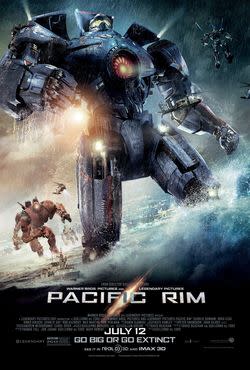Comic-Con Ate The Movies
If the entertainment industry has taken over Comic-Con, it's probably equally accurate to say that the Comic-Con industrial complex — that is the audience for comic books and science fiction — has taken over the movie business. And, if you're a movie fan, that's not a good thing.
RELATED: Marvel Has No Match for Superman Right Now
Hollywood has been obsessed with making big movies that can become multi-picture, marketing tie-in, merchandising-rich franchises and milked for the big bucks for a while. And right now, if that means comic books.
RELATED: Let's Not Freak Out About the Han Solo Movie Just Yet
If you want to place blame, we say look to Marvel and Disney. Way back at the 2007 Comic-Con, Iron Man was met with a wary eye, as the staff of the Playlist recalls. Tony Stark was not Clark Kent or Bruce Wayne, and Robert Downey Jr. was probably best known for his performance in the Los Angeles criminal justice system. But the footage shown at Comic-Con was, as the Playlist describes, an "instant hit" and the rest, they say, is history. Marvel Studios had ingeniously engineered a plan for their Marvel Cinematic Universe, featuring a series of individual character movies that eventually led up to 2012 The Avengers,which was the third-highest grossing movie of all time and completed Marvel's Phase One. Disney acquired Marvel Entertainment in 2009 for $4 billion, and as James Hibberd and Anthony Breznican wrote at Entertainment Weekly Marvel went big at Comic-Con in 2010. "The Avengers panel in 2010 brought together all of the cast and helped build anticipation — not just for The Avengers, but for Thor and Captain America," Hibberd and Breznican explained. "Images and news stories from the panel went global, and the Hall H crowd served as a megaphone for the film."
RELATED: Disney Animation Is Ready to Charm You Again, This Time with Marvel, Not Pixar
So that worked. And the Marvel movies have been well-made. But—especially looking at the numerous tentpole disasters of the summer—success breeds imitation and many of the movies drafting off of Marvel's recent dominance are either failing at the box office (Pacific Rim) or doing little to win any critics over (Man of Steel). Comic-Con is a place where franchises thrive. Fanboy/girl excitement is often driven by a pre-disposed connection to the material and a desire to consume as much of it as possible, and that's fine, but in return, the industry is getting bloated.
RELATED: Sad George Lucas Handed 'Star Wars' to Disney Without a Big Fight
Now other entities are trying to replicate Marvel's success. Warner Bros. and DC, for instance, have started to play that game with Man of Steel. Disney, now in control of Lucasfilm as well will look to do something similar with Star Wars, not simply producing a new trilogy, but also standalone films based on individual characters. Marc Webb of Sony's The Amazing Spider-Man—which has a notable Comic-Con presence this year—is now talking in terms of "universe," with plans for third and fourth movies to come out with a seemingly unruly second in the works. Marvel, meanwhile, is delving into even more obscure properties. Phase Two of their cinematic universe will feature Guardians of the Galaxy, which stars a buff Chris Pratt and a raccoon.
RELATED: Predicting the Title of 'Star Wars: Episode VII'
Marvel hasn't faltered yet, but their schtick is also becoming exhausting. Iron Man 3 was a good enough movie, but it also felt somewhat rote. Sure, Ben Kingsley's performance was fun, but is this whole thing just a chance to sell more merchandise?
But Comic-Con failures are also part of the story, as studios throw big bucks into potential franchises that might end up flopping critically or at the box office. (Look to this weekend for another example: R.I.P.D., which cost $130 million and has flop written all over it.) Hibberd and Breznican posited: "Does Comic-Con matter?" It's a funny thing to wonder for a publication that goes whole-hog on the event, but there's a legitimate point. The writers use the recent release of Pacific Rim as an example. "The film had a massive Comic-Con appearance last year, yet the monsters vs. robots title struggled to break out of its geek-ghetto and find mainstream appeal," they explained. "Pacific Rim opened at third place last weekend." Part of that storyline is how much Guillermo Del Toro's monsters vs. robots epic cost to make: nearly $200 million. That's a big investment in a franchise that might not be, though there is sequel talk. (And, yes, it's important to note that: unlike the Marvel movies, Pacific Rim wasn't based on any source material and so does not have a built-in fans. That said, Guillermo Del Toro has plenty of geek cred.)
The problem is with niche-market success stories that went mainstream like the Marvel movies is that studios think they can have the repeat effect. And it's important to remember, as Hibberd and Breznican point out: "The Comic-Con crowd is a powerful niche group, but still a niche." That means movies like Pacific Rim are set up for failure. Sure, you can argue that Del Toro needed all that money to make Pacific Rim, but he's also made plenty of movies for less. Perhaps the studio should have just let Pacific Rim be what it is a cult movie. Studios may be better off embracing lower budget films, like horror success The Purge, and allowing them to become surprise favorites. A Purge sequel is in the works.
Comic-Con is all about expectations. It's about teasers and previews. (We haven't even gotten into Y.A., which had a big showing yesterday at the Ender's Game and Divergent panels.) But now the industry is essentially asking for high expectations. And that sets everyone up for disappointment.




